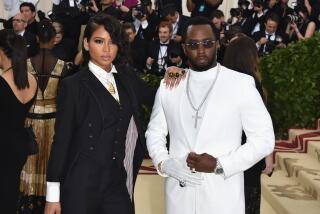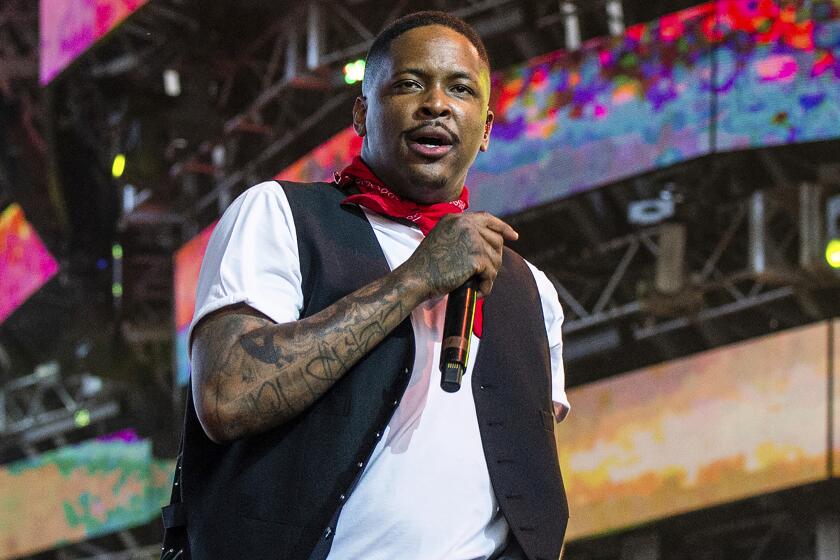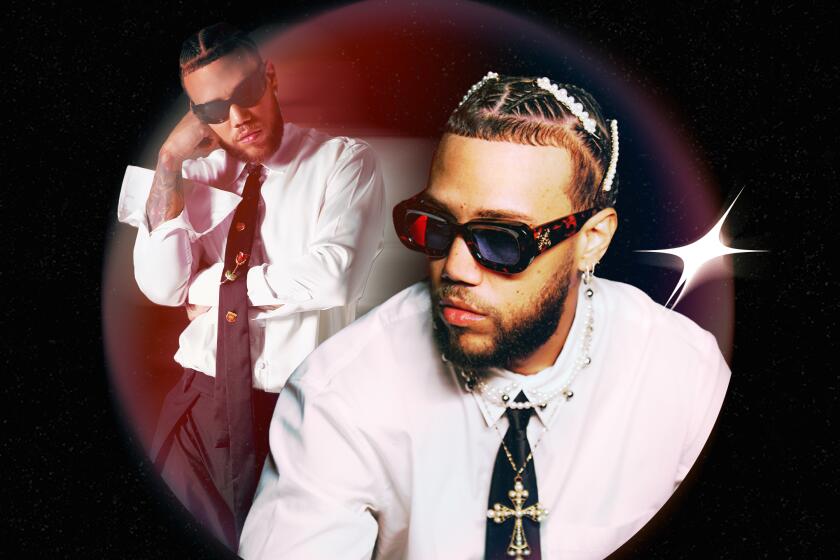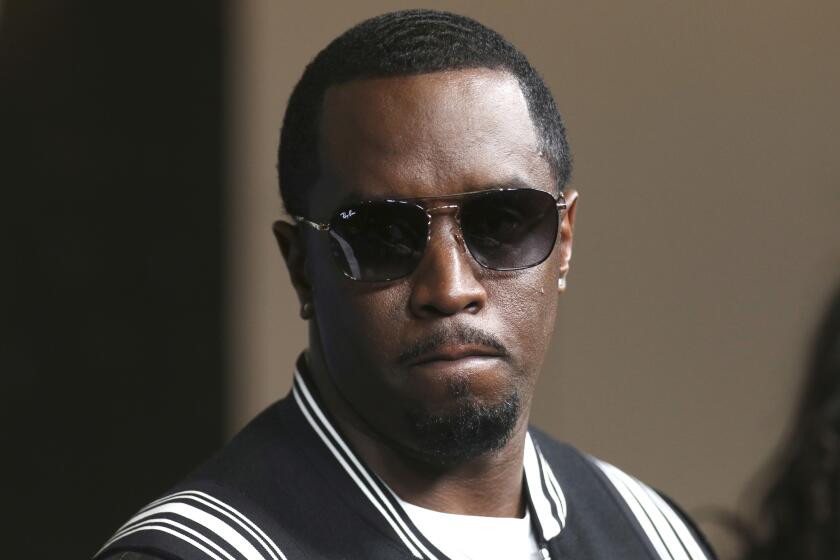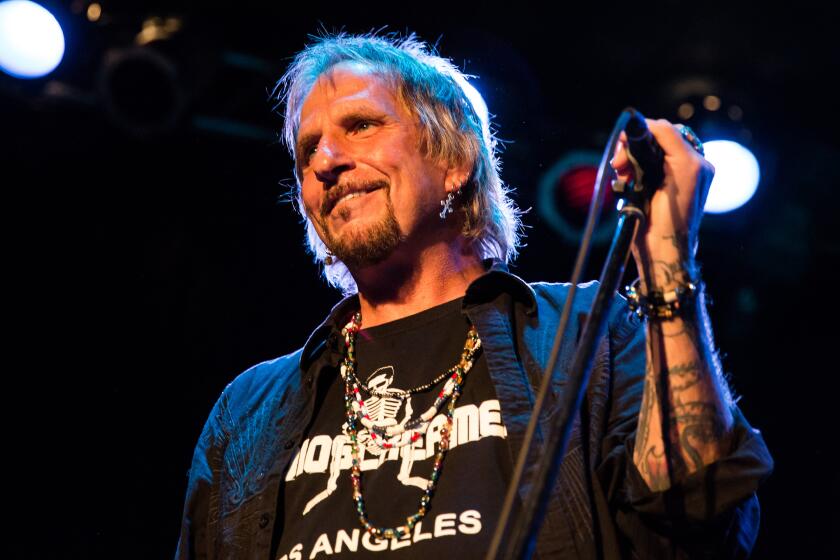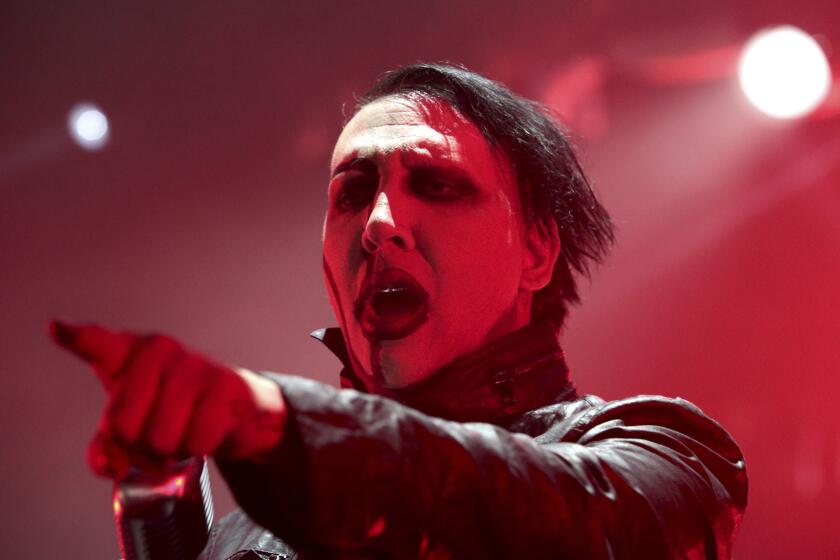Rising Above the Anonymous
Don’t feel alone if pop music seemed unusually anonymous to you over the last 12 months. It was bad enough that so many records sounded alike in a year dominated by generic hip-hop and ska beats, but it was often hard to even keep the names of the acts themselves straight.
Who did that song on the radio again? Was it the Verve or the Verve Pipe? . . . 311 or 112? . . . LSG or MJG? . . . Aqua or the Aquabats? . . . Hurricane G or Hurricane #1 . . . Sister Hazel or Uncle Sam?
How fitting, then, that Bob Dylan returned to action with “Time Out of Mind,” which helped restore order to the proceedings by reminding us of the importance of individuality and songs. The album, filled with themes that were both revealing and bold, was the year’s most distinguished work.
To varying degrees, that same sense of independence and songwriting characterized all the albums on my list of the year’s 10 best--from the studied sophistication of Erykah Badu to the everyman intimacy of Ron Sexsmith.
The most dramatic aspect of the list is the strong presence of British rock. Four of the 10 entries are from England, where a new generation of rock artists--led by Oasis’ Noel Gallagher--has refocused on the traditional elements of songwriting craft and point of view.
In the U.S., the most vital musical strains were found in hip-hop, where, encouragingly, female artists--including Badu and Missy “Misdemeanor” Elliott--set the creative tone for the first time in a field dominated by males.
1. Bob Dylan, “Time Out of Mind” (Columbia). Just when it seemed that son Jakob had taken over the Dylan mantle in pop, the father gives us a work so filled with commentary and bite that it rivals his best work from the ‘60s. The centerpiece of Dylan’s first package of new songs in seven years is “Highlands,” a marvelous, 16-minute reflection on life after the sweet optimism of youth has been lost.
There are moments in the album, which was produced by Daniel Lanois, when Dylan steps into the sunshine, finding comfort in spiritual beliefs or in memories of old loves and old times. Mostly, however, it is an album of darkness--as the songs, with their folk, blues and country accents, speak of adjusting to the boundaries that age erects around once limitless dreams.
It’s especially sobering to play “Time Out of Mind” after listening again to “Highway 61 Revisited,” the 1965 album that may have best captured the cocksure independence of young Dylan and the ‘60s generation.
2. The Verve, “Urban Hymns” (Virgin). This album belongs on a shelf with “Tonight’s the Night,” Neil Young’s brilliant 1975 look at disillusionment and despair.
The difference is that “Tonight” sounds like something Young wrote in the midst of depression (following the drug-related deaths of two friends), while the Verve’s Richard Ashcroft apparently wrote most of these songs after overcoming personal and professional problems that caused the Verve to break up briefly in 1995.
While you feel the lingering scars of the traumatic times in the album’s melancholy strains, Ashcroft weaves elements of optimism and faith into the material in ways that are often quite beautiful.
3. U2, “Pop” (Island). To reach the commercial heights of a U2, you have to do more than write great songs. You also have to be something of a strategist with a feel for the pop pulse. In this album, the Irish quartet came up with a good idea (the merging of dance currents and songwriting craft), but the marketing was confusing.
As soon as the first single, the aggressive, dance-minded “Discotheque,” hit the airwaves, rock fans thought the Irish band had made some arbitrary move into dance music in order to be au courant, while the dance world looked on the band as interlopers. As a result, “Pop” never really found its audience in this country. On its own, however, “Pop” is a superior work that, like all of U2’s albums, was rooted in songs that explored the struggle between transient and enduring values.
4. Radiohead, “OK Computer” (Capitol). The songs are frequently icy and for-bidding, mostly about living in an anxious age and looking at an even more uncertain, technological future. But Thom Yorke’s vocals and images infuse the record with an ultimate belief in mankind that is disarming and warm. The songs, too, are framed with the kind of lovely guitar and keyboard textures that sound artful but far from sterile.
5. Erykah Badu, “Baduizm” (Kedar/Universal). Part of the strength of this debut is that Badu has as deep a feel for cultural tradition as for musical history. This allows her to draw inspiration equally from Nina Simone and Billie Holiday, or Bob Marley and Marvin Gaye. A singer with exceptional style and command, Badu--whose roots are in both soul and jazz--gets too much into philosophizing between songs on her new live album, but she keeps things on target and lean in this memorable studio collection.
6. Prodigy, “The Fat of the Land” (Maverick). Don’t expect political correctness or even common sense all the time from the first superstars of techno. “Smack My Bitch Up” was never meant to encourage violence, any more than the band’s “Firestarter” was designed to encourage kids to strike matches. But Liam Howlett, the leader of this British quartet, knew the title was going to offend. He thrives on confrontation, which enabled him in this breakthrough album to thumb his nose at the boundaries between rock and dance music by incorporating the attitude and rebellion of rock with the energy and pulse of dance.
7. Missy “Misdemeanor” Elliott, “Supa Dupa Fly” (Gold Mind/Elektra). In some ways, this is the most remarkable album on the list, because Elliott has been able to come up with something fresh and interesting in a crowded hip-hop field where fan acceptance is so strong that even the most ordinary, recycled strains get pushed to the top of the charts. Here, Elliott and writing-producing partner Tim (Timbaland) Mosley seem to be concerned as much with creative standards as with chart position.
8. Ron Sexsmith, “Other Songs” (Interscope). Though this Canadian singer-songwriter will likely remind you more of John Prine than Bob Dylan, it would be interesting to hear Sexsmith on the same bill as Dylan--just to see the contrast between Sexsmith’s relatively relaxed, small-scale looks at life’s quiet moments and Dylan’s epic, intense explorations of life’s most dramatic ones.
9. Portishead, “Portishead” (Go!Beat/London). There’s an eerie, even frightening intensity to Beth Gibbons’ vocals that makes these songs of obsession and pain all the more unshakable. Though it’s her voice that you’ll remember, it’s co-writer and studio whiz Geoff Barrow who largely shapes the British outfit’s lovely yet bittersweet soundscapes.
10. Bjork, “Homogenic” (Elektra). It’s possible that Bjork and Gibbons have the same dreams. The difference is that Gibbons turns them into songs, while Bjork tries to re-create the dreams on record. The music here is not as dark as Portishead’s, but the strains are as adventurous, boldly mixing strings and dance elements, and the songs themselves more mystical.
More to Read
The biggest entertainment stories
Get our big stories about Hollywood, film, television, music, arts, culture and more right in your inbox as soon as they publish.
You may occasionally receive promotional content from the Los Angeles Times.
